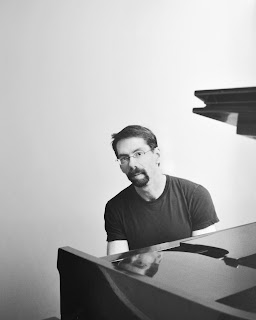Fred Hersch Masterclass: "Found Chords" and More
 |
| Photo: David Bartolomi |
Here are a few things that stuck out to me:
Found Chords
While discussing the importance of specificity in playing tunes so as to avoid being generic (this was after a rendition of "Let's Cool One"), Fred mentioned that if he felt that he was getting into a rut while playing, he'd sometimes deliberately try to surprise himself. One way was simply to play some experimental chords without necessarily knowing exactly how they'd said, and respond to and work with it once he heard it.
He mentioned that he had a hunch about how Herbie came up with so many incredibly sophisticated chords and voicings in the '60s while working with Miles: essentially, that Herbie worked off of intuition and his years of practicing and sometimes just "put his hands down" and went off of whatever came out of the piano.
For some reason, I immediately thought of "existence precedes essence," the classic Sartre-ism that stipulates that humans exist before they even have a reason to be there—the reason comes later, hopefully by humans deciding for themselves what reason and meaning to make for themselves and not necessarily by mindlessly following religious or ethical dogma.
So maybe this approach to making music interesting is related, in a strange way: you find these chords that already exist in nature—by sheer virtue of a piano having 88 keys and having the possibility of this particular combination of notes for this chord—and once you've got it, then you can do what you wish, whether that's theorizing and taxonomizing it (as Fred put it, did Herbie really think "+5, omit the 3rd, put the 4th on the top, b9?"), or use it as an impetus for further exploration or development.
It's a pretty cool way to think about music, and I think it puts some of the mystery and wonder back into improvising—the sense of discovery that you lose ipso facto when you have preconceptions about what Fmaj7 means.
And on a slight tangent, I think this "play first and taxonomize later" approach is related to something I heard Taylor Eigsti talk about at a "Cool Chords" masterclass a few years ago at Stanford: Taylor talked about not shedding voicings per se so much as shedding physical shapes, which he'd "feel," in both the literal and intuitive-figurative sense, while comping for himself and others. Maybe the bottom line is that intuition can be underrated when there's such immense pressure in the "jazz marketplace" to perform and present your cleanest, most precise self in face of all the competition; it's intuition that sets you free.
Long Form
Fred made a point really memorably about how to conceptualize a long form solo that consistently engages the listener and possesses a narrative arc. It's also related on the microlevel to being free with your phrasing, but he phrased the issue as one of attitude:
"5 choruses of a tune isn't '32 x 5' — it's 160 bars of music."
It's pretty obvious, but I like this kind of paradoxical statement: 32 x 5 ≠ 160 for the most mature musicians, because although they think about choruses as a means of navigating the form, the big picture is more important.
Shedding Count-offs
Getting the right tempo is really tough. Robin Kelley includes memories from musicians who worked with Monk about how they always found Monk's tempos hard to play—hard to play in a good way, in the sense that they were unique and deliberate, or the opposite of generic. Fred was answering a question about how to get a band to start grooving from the very first note, rather than having a settling-in period, and he mentioned that how you count off—the verbal and physical communication in the count off itself—will change how the musicians interpret the tempo. He recalled practicing count offs since he had been chastised by older musicians when he was less experienced for not being consistent with his count offs. He put it this way:
"Take ten extra seconds to save yourself six or seven minutes of agony."
Dedicated Listenings
It's nice when teachers aren't super-prescriptive all the time, but it was nice to hear Fred give one piece of advice that was relatively prescriptive compared to the other general wisdom he had to offer. He said this: music students should do an hour or two of concentrated listenings per day, at least. Back in his time, he said he'd hang out with friends and listen to LPs—late night listening sessions, hangs, whatever. He suggested listening to a track seven times and checking out something specific every time: how the piano comps behind different soloists, how the bass player sets the time, etc. Listening parties are really just hangs, and they should be, I think, but it's a simple enough thing to just set aside some time with friends to do some serious listening; it's easy to not want to at school, since most time is already taken up by rigid commitments, but I think I'll try to put some time for hanging and dedicated listening.
* * * * *
Comments
Post a Comment